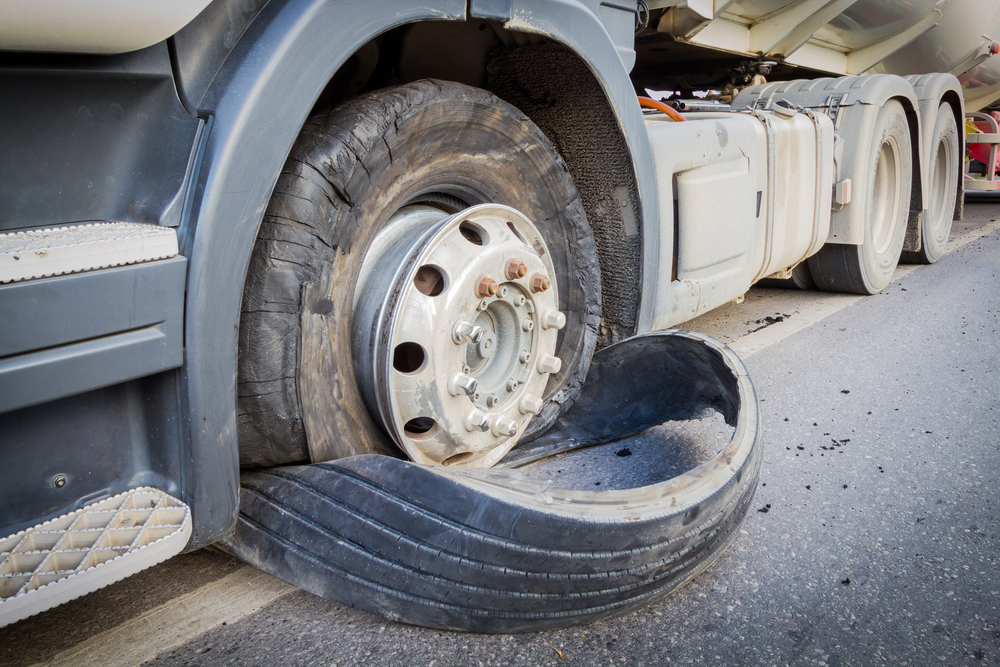
 Request FREE consultation - 1866-758-4529
Request FREE consultation - 1866-758-4529 
When you see a large semi-truck on the road, you notice that it has many more tires than passenger vehicles. You likely assume that the extra tires will prevent problems in case one of the tires fails. While the extra tires support the truck and keep it on the road, a tire blowout is still a dangerous and potentially deadly occurrence.
If you were hurt in a truck accident due to a tire blowout, you need assistance from an experienced truck accident attorney. Our skilled team understands how to handle the numerous issues associated with truck crashes and will help you obtain the compensation you deserve for your injuries.
Several factors can cause a truck tire to fail. Most accidents due to truck tire problems could be avoided if the owner and driver performed proper maintenance and adequate inspections before each trip. Improper tire pressure is one of the most common reasons for tire blowouts, yet it is one of the easiest to correct. Various factors, including load weights, outdoor temperatures, and elevation, may all contribute to the air pressure inside a tire. The driver should inspect the tires for proper pressure before hitting the road.
Another reason a tire may blow out is due to wear. A worn-out tire is more dangerous because it has less tread to keep the vehicle on the road and to help stop it. Tires that are worn out can blow out at any time, causing the driver to lose control of the truck. Heat is a problem with tire integrity. When a truck travels at a higher speed, it generates more heat on the tires. Additionally, traveling in hot climates can also increase the heat of the tires. This increased heat can take its toll on tires, causing them to blow out unexpectedly.
Truck tire compliance, safety, and accountability are administered by the Federal Motor Carrier Safety Administration (FMCSA). There are numerous rules in place that govern truck tire safety. Generally, a truck should not operate when the tires are not properly inflated, when the tread is worn, or when there is damage to the tires. The tire tread must be at the minimum depth for the vehicle’s type. If the tires do not meet the minimum requirements, the truck must be taken out of service until the necessary repairs are made.
A tire blowout is not as simple as a flat tire. When you consider that a truck could weigh as much as 80,000 pounds and might be traveling at speeds of more than 55 miles per hour, the risk of losing control of the vehicle is significant. When a tire blows, it causes a shift in the vehicle’s motion, and this can even shift the cargo inside. The sudden change in force causes the truck to lunge to one side or the other. The driver has little to no control over the vehicle’s trajectory.
Sometimes the driver is able to get the truck under control and bring it to a safe stop on the side of the road. Many times, however, a tire blowout causes the truck to veer sharply into other lanes of traffic. As the driver tries to compensate for the changes, he or she may steer the vehicle in the other direction, which continues to cause problems. In some instances, the truck may smash into other vehicles, overturn, or swerve off the embankment.
Regardless of how the accident occurred, truck crashes can be dangerous and may cause severe injuries and fatalities. If you were injured in a truck accident, we can help you obtain the compensation you deserve for your injuries. Contact the tractor-trailer accident lawyer for a no-obligation consultation-
Related Articles:
Truck Tire Blowouts Cause Dangerous Accidents
Tire Safety for 18-Wheelers Begins with the Pre-Trip Inspection
Truck Tire Blowouts a Common Cause of Big Rig Accidents
Semi-Truck Towing Accident in Rush County Leaves Two Dead
Recent fatal semi accidents involving tires(Opens in a new browser tab)